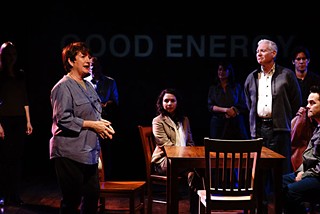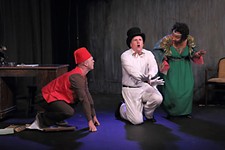The Laramie Project: 10 Years Later
The follow-up is no mere epilogue but a powerful tale that stands on its own
Reviewed by Dan Solomon, Fri., May 11, 2012

The Laramie Project: 10 Years Later
Zach Theatre Kleberg Stage, 1421 W. Riverside, 476-0541www.zachtheatre.org
Through May 13
Running time: 1 hr., 50 min.
Though The Laramie Project: Part One has one more Saturday matinee left before it closes its months-long run at Zach, the theatre has turned its focus to the piece that bills itself as that play's epilogue, The Laramie Project: 10 Years Later. Which prompts an interesting question: How effective is an epilogue as a stand-alone work?
In this case, very. While some background is important, everything a person needs to know to be compelled and engaged by the second part of The Laramie Project is built right in to its script. A theatre company from New York had gone to Laramie, Wyo., in 1999 to interview residents about the brutal murder of Matthew Shepard, the gay University of Wyoming student whose death helped spur the national conversation about hate crimes, for the purpose of creating a performance piece. If you know that, you're ready for 10 Years Later, which revisits Laramie and its citizens to see how people attempt to take ownership of their own history.
It's a powerful script, and, as staged by Artistic Director Dave Steakley, Zach does it justice. The eight cast members are all effective and, with all playing multiple roles, provide an interesting opportunity to see how different actors engage with characters. Frederic Winkler comes off as expository when he's portraying Jim Osborne, a friend of Shepard's, but he's electric as the incarcerated Aaron McKinney, one of the two men convicted of Shepard's murder; Sarah Richardson plays Laramie policewoman Reggie Fluty with a distracting, Sarah Palin-esque accent but inhabits the role of university professor Catherine Connolly intuitively. Others, like Jenny Larson and Janelle Buchanan, shine as utility players in a series of more understated roles, deftly facilitating the story. It's not a script that requires perfection, and the cast is more than able to tell this story.
At its core, that story is less about Shepard than it is about the town of Laramie and the way people try to control the narratives about themselves. Throughout the play, characters – especially Laramie residents – argue that Shepard's murder wasn't because he was gay, that it was a drug deal gone bad or a botched robbery, and the play, for the most part, is brave enough to confront this self-mythologizing without condemning the people who participate in it. The facts of the case make it clear that Shepard's death was a hate crime. And while it climaxes with the passage of the Matthew Shepard and James Byrd Hate Crimes Act, 10 Years Later is, at its best, a story about how the urge toward denial by a community is part of what necessitates that sort of protection. That's no mere epilogue – that's a story that stands on its own.










